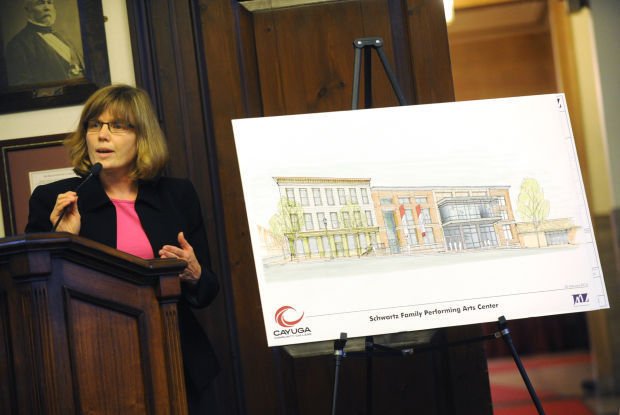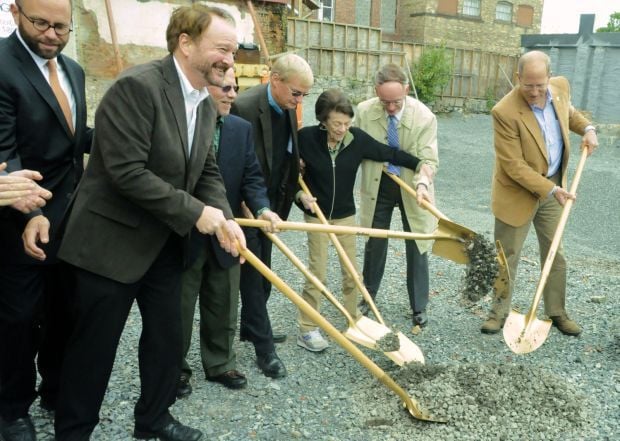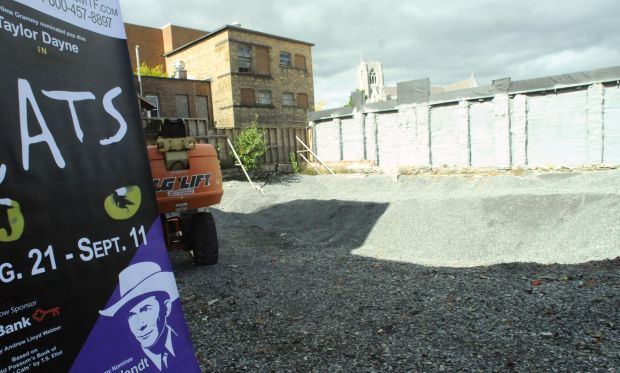The Finger Lakes Musical Theatre Festival's plan to build a downtown Auburn theater has been a subject of speculation ever since the festival cancelled its Schwartz Family Performing Arts Center project .
That speculation appears to be at an end: In a summer letter to its subscribers that Ë®ąűĹÉAV recently obtained, the festival announced that it "will not devote any more time or resources to building a new theater."
The decision, the festival wrote, came at the recommendation of the DeVos Institute of Arts Management at the University of Maryland, which recently with the festival on its future direction. And the institute told the festival that there is neither enough growth nor incoming tourism to support a new venue in downtown Auburn.
People are also reading…
"Conditions required to build a second theatre are not present, nor is the demand," DeVos was quoted as saying in the subscriber letter.
Additionally, in a second letter obtained by Ë®ąűĹÉAV, the festival told the theater project's donors that they could have their money back. The festival gave donors the option of either receiving a refunded amount adjusted for the Schwartz's development expenses, or allowing the festival to use the money "in any manner appropriate to further the development of the Festival."
AUBURN | What could have been a new downtown theater in Auburn will remain an empty lot on S…
Taken together, the festival's letters mark possibly the final chapter for its downtown Auburn theater project, which now spans almost a decade of sweeping ambition followed by setbacks.Â
The theater, and the festival itself, was of a 2007 focus group report, A Call to Action: A Blueprint for Our Region's Future. A site was in the former Kalet's department store at 1-7 State St., which was .
The festival — which held its  in 2012 at the Merry-Go-Round Playhouse, Auburn Public Theater and Theater Mack — partnered with Cayuga Community College to try to build the fourth venue. It'd take the name of the Schwartz Family Performing Arts Center and the form of a $7.8 million, 12,450-square-foot space with . Together, the festival and college on the project in 2013.
However, the theater quickly found a heckler in neighbor Joseph Camardo. The took the festival, college and city of Auburn for alleged damages to his building, illegal use of public funds and, principally, an improper environmental review of the former Kalet's lot.
In June 2014, after $200,000 in legal fees, the festival announced the Schwartz's cancellation.
The college, under new leadership, would leave the project shortly thereafter. But the festival reassured the Auburn public that its fourth venue remained a possibility.Â
At the time of the Schwartz's cancellation, then-festival board President Bob Simmons told Ë®ąűĹÉAV that the theater "can still move to a different location. ... We're not looking to abandon the downtown area." In October of that year, Producing Artistic Director Brett Smock the festival was "actively prospecting" for a new home for the project.
After that, though, news was scarce — until earlier this year.
Should Auburn be named the winner of a $10 million state grant competition at the end of Jun…
In a January bid to the city to redevelop 1-7 State St., to know that the festival was eyeing the neighboring 9-15 State St. for its downtown venue. That lot would be by the Stardust Entrepreneurial Institute. The organization's board chair and president, Jack Bisgrove, said at the time that the property could become the site of the festival's theater "if they have their financials in place."
But, according to state Charity Bureau filings, those financials have been dwindling. Musical Theatre Festival Inc., an entity that manages the theater project separately from the festival's other operations, has seen its total asset value shrink from more than $5 million at the end of 2013 to $931,277 in 2015. Much of the decrease came from a pledge reversal of $1.8 million and the write-down of the Schwartz's in-progress value from $800,000 to $0.
Due to MTF's changing relationship with the festival proper, a precise tally of its received — and, now, returnable — donations is difficult. After splitting from the festival's operations to focus on the theater project, MTF received almost $75,000 in 2013 and $310,318 in 2014. Donations in 2015 were $0, suggesting MTF stopped soliciting them due to the project's status.
The festival had been seeking the donations to match $3.8 million in SUNY funding, for which the project became ineligible when Cayuga Community College left.
This summer, however, a potential lift appeared on the horizon when the city in state funds through the Downtown Revitalization Initiative. Among its six proposed uses of the money, the city  a multi-use facility at 1-7 State St. that some city officials as a performing arts center. A letter of support from Smock was attached to the application, but it made no explicit mention of building a downtown theater.
It is unclear whether the festival received DeVos' report before or after the city filed the application. Smock did not respond to a Friday request for comment on the downtown project's cancellation, and current festival board President Jan Smolak could not be reached.
Gallery: The Finger Lakes Musical Theatre Festival's downtown Auburn theater project, over the years
Here is a pictorial history of the Finger Lakes Musical Theatre Festival's almost decade-long project to build a theater in downtown Auburn. The festival told subscribers this summer that it is no longer pursuing the project, and offered donors a refund.
Lake Life Editor David Wilcox can be reached at (315) 282-2245 or david.wilcox@lee.net. Follow him on Twitter .























